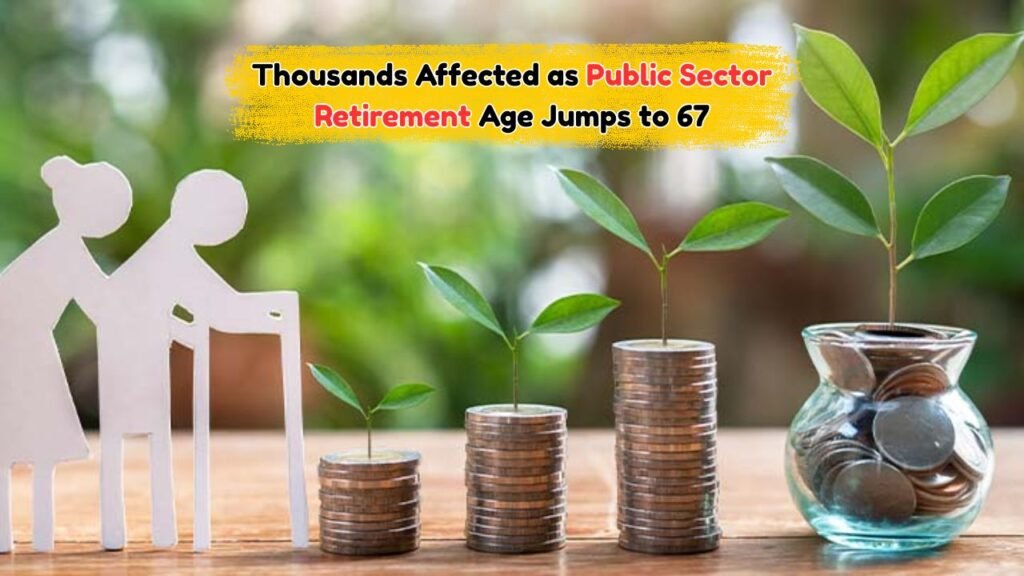South African Public Servants Confront New Retirement Challenge: Age Limit Raised to 67: In a landmark decision that has sparked widespread discussion, South Africa has announced a significant change in the retirement age for public servants, extending it from 65 to 67. This move is set to impact thousands of government employees across the nation, altering the landscape of retirement planning and employment. The adjustment is part of a broader strategy to address the country’s evolving demographic challenges, ensuring a sustainable pension system for future generations. As public servants brace for this change, questions arise about the implications for their career trajectories, financial planning, and personal lives. This shift not only reflects global trends of increasing retirement ages but also underscores the need for adaptive strategies to manage the workforce efficiently.

Understanding the New Retirement Age Policy for Public Servants
The decision to raise the retirement age for public servants in South Africa from 65 to 67 is grounded in several key factors. Primarily, the government aims to alleviate the financial pressure on the national pension system by keeping employees in the workforce longer. This change aligns with global trends observed in countries facing similar demographic challenges, where the aging population and longer life expectancies necessitate adjustments in retirement policies. By extending the working years of public servants, the government anticipates a reduction in pension payouts in the short term while allowing individuals more time to contribute to their retirement savings. This policy shift invites public servants to reconsider their long-term career plans and financial strategies, offering an opportunity to reassess goals and expectations. While some may view this as an opportunity to prolong their careers and enhance their professional contributions, others might see it as a delay in pursuing post-retirement aspirations. Nevertheless, understanding the motivations behind this policy and its potential benefits is crucial for public servants adapting to these changes.
Implications of the Retirement Age Increase on Workforce Dynamics
The increase in the retirement age for South African public servants is poised to have significant implications on workforce dynamics within government sectors. One immediate effect is the potential for an older workforce, which may influence productivity, innovation, and mentorship opportunities. Experienced employees remaining in their roles longer can provide invaluable knowledge and stability, offering mentorship to younger colleagues and ensuring continuity in public service operations. However, this shift also necessitates adjustments in workforce planning, as the delayed retirement of senior employees may impact promotion opportunities for younger staff. The challenge for management will be to balance the retention of experienced workers with the need to foster the growth of new talent. Additionally, the extended working period may prompt discussions around workplace accommodations, health benefits, and job flexibility to cater to an older workforce. Public sector organizations will need to implement strategies that address these evolving needs, ensuring a supportive environment that maximizes the potential of all employees, regardless of age.
Retirement Planning Strategies for Public Servants Facing Extended Careers
With the retirement age now set at 67, South African public servants must adapt their retirement planning strategies to accommodate longer careers. Financial planning becomes increasingly important, as individuals have additional years to save and invest for their retirement. Public servants are encouraged to reevaluate their retirement savings plans, considering options that may offer better returns over extended periods. Additionally, the extra working years present an opportunity to upskill and diversify career paths, potentially opening doors to new roles or responsibilities within the public sector. This period can also be used to strengthen networks and build expertise that may benefit post-retirement endeavors, such as consulting or part-time work. Moreover, public servants should consider the implications of extended careers on personal and family life, balancing professional commitments with personal aspirations. By taking a proactive approach to retirement planning, public servants can navigate this transition effectively, ensuring financial security and personal fulfillment in their later years.
Societal and Economic Impact of Raising the Retirement Age
The decision to raise the retirement age for public servants in South Africa is likely to have broader societal and economic impacts that extend beyond the individuals directly affected. Economically, this policy may contribute to a more robust national pension system by decreasing the immediate financial burden of payouts, potentially freeing up resources for other critical areas of public expenditure. On a societal level, the presence of older employees in the workforce can challenge stereotypes about aging, promoting a culture of inclusivity and respect for the contributions of experienced individuals. However, the policy also raises questions about the readiness of the economy to integrate an aging workforce, highlighting the need for policies that support lifelong learning and skill development. As the country adapts to these changes, it is crucial to consider the long-term vision for economic growth and social cohesion. Ensuring that public servants are supported through this transition, with access to resources and guidance, will be vital in maximizing the benefits of this policy shift for both individuals and society at large.




